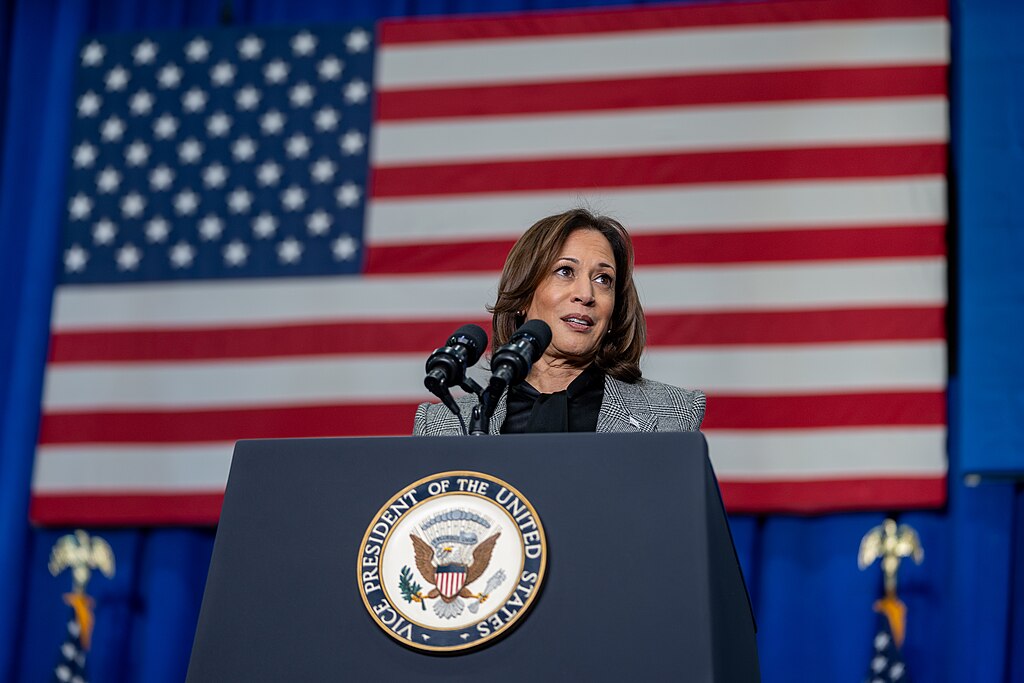Vice President Kamala Harris is under increasing scrutiny for her repeated use of the same rehearsed phrases during public appearances, drawing comparisons to a notorious moment in the 2016 GOP primary debates when Senator Marco Rubio was called out for his repetitive talking points. Critics argue that Harris’ reliance on familiar rhetoric may weaken her public image, particularly as she prepares for the challenges ahead of the 2024 election.
The situation echoes Rubio’s widely remembered misstep in a 2016 debate, when he repeatedly delivered the same talking point, prompting then-New Jersey Governor Chris Christie to call him out for the over-reliance on scripted lines. The moment is often cited as a turning point in Rubio’s campaign, as it led to negative coverage and further attacks from his opponents.
Harris’ critics are now making similar observations, noting that she has often leaned on familiar phrases and pre-packaged responses when addressing key issues. While this is not uncommon in political communication, especially for high-profile figures, the frequency and repetition of certain statements have led to increased media attention. Political commentators have questioned whether Harris is effectively engaging with the public or simply relying on polished but overused soundbites.
The comparison to Rubio is striking given the impact that moment had on his campaign. In the 2016 GOP primary, Rubio was viewed as a rising star with strong debate skills, but his robotic repetition of the same phrase damaged his credibility. Some analysts are beginning to wonder if Harris could face a similar backlash as she prepares for a potential presidential run or continues to support President Joe Biden in the 2024 race.
Harris has faced other communication challenges during her vice presidency, with some critics pointing to moments where her responses appeared vague or lacked depth. Despite her impressive political resume, which includes serving as a senator from California and attorney general of the state, Harris has struggled to maintain consistent public approval, particularly in handling sensitive policy topics. Repeated phrases may only add to concerns about her communication style.
Supporters argue that Harris’ messaging is rooted in the need for clarity and consistency, especially on issues like voting rights, economic recovery, and healthcare. They believe that repetition can help reinforce key policy points, ensuring that voters understand her positions. However, the growing focus on her repetitive statements suggests that this approach may not resonate with all audiences.
As the political landscape becomes more competitive ahead of the 2024 election, public perception of Harris’ ability to communicate effectively will be critical. The vice president is expected to play a key role in the Biden administration’s reelection efforts, particularly as President Biden himself faces questions about his age and vigor.
The potential for Harris to face the same level of criticism as Rubio did in 2016 remains uncertain. However, the parallels between their communication strategies raise questions about how political figures can avoid being boxed in by rehearsed lines while maintaining a consistent message.
EconoTimes cannot independently verify the claims regarding Kamala Harris’ communication strategy or the comparisons to Marco Rubio’s 2016 debate performance.



 Middle East Air War Triggers Massive Flight Cancellations and Global Airline Disruptions
Middle East Air War Triggers Massive Flight Cancellations and Global Airline Disruptions  U.S. Pledges Support to Turkey After Iranian Missile Threat
U.S. Pledges Support to Turkey After Iranian Missile Threat  US Lawmakers Raise Security Concerns Over Intel Testing ACM Research Chipmaking Tools
US Lawmakers Raise Security Concerns Over Intel Testing ACM Research Chipmaking Tools  U.S. Officials Review Tencent’s Stakes in Epic Games, Riot Games Over Security Concerns
U.S. Officials Review Tencent’s Stakes in Epic Games, Riot Games Over Security Concerns  Nepal General Election 2026: Youth Protests, Political Change, and a New Generation of Voters
Nepal General Election 2026: Youth Protests, Political Change, and a New Generation of Voters  Trump Praises Delcy Rodríguez as Venezuela Oil Exports Resume
Trump Praises Delcy Rodríguez as Venezuela Oil Exports Resume  Australia and Canada Strengthen Critical Minerals Partnership Through New G7 Alliance Agreements
Australia and Canada Strengthen Critical Minerals Partnership Through New G7 Alliance Agreements  Rubio, Saudi Foreign Minister Discuss Iran Threats and U.S. Embassy Riyadh Attack
Rubio, Saudi Foreign Minister Discuss Iran Threats and U.S. Embassy Riyadh Attack  Senators Urge Better Coordination After Texas Counter-Drone Incidents Disrupt Airspace
Senators Urge Better Coordination After Texas Counter-Drone Incidents Disrupt Airspace  Defense Contractors Move to Drop Anthropic AI After Trump Administration Ban
Defense Contractors Move to Drop Anthropic AI After Trump Administration Ban  Santander’s $12.2B Webster Financial Deal Faces Uncertainty Amid U.S.–Spain Trade Tensions
Santander’s $12.2B Webster Financial Deal Faces Uncertainty Amid U.S.–Spain Trade Tensions  U.S. Interior Department Responds to Leak of Trump Administration Plans to Revise National Park History
U.S. Interior Department Responds to Leak of Trump Administration Plans to Revise National Park History  U.S. Begins Charter Evacuations as Iran Conflict Disrupts Middle East Air Travel
U.S. Begins Charter Evacuations as Iran Conflict Disrupts Middle East Air Travel  Trump Defends Extended U.S.-Israel Military Campaign Against Iran
Trump Defends Extended U.S.-Israel Military Campaign Against Iran  Michael Whatley Wins North Carolina GOP Senate Primary, Setting Up High-Stakes Battle With Roy Cooper
Michael Whatley Wins North Carolina GOP Senate Primary, Setting Up High-Stakes Battle With Roy Cooper  U.S. Military Strikes on Iran Complicate Xi-Trump Summit and Expose China’s Energy Risks
U.S. Military Strikes on Iran Complicate Xi-Trump Summit and Expose China’s Energy Risks  Spain Denies Deal With U.S. Military After Trump Threatens Trade Cutoff
Spain Denies Deal With U.S. Military After Trump Threatens Trade Cutoff 




























